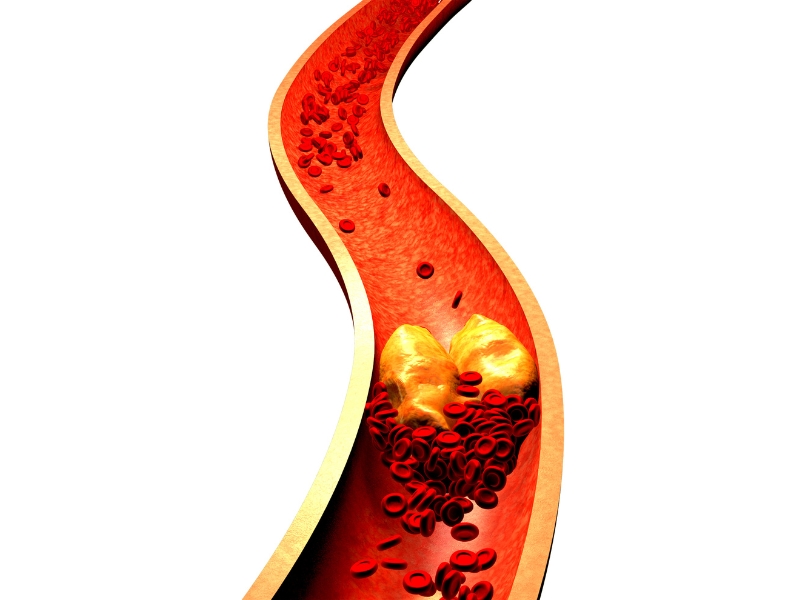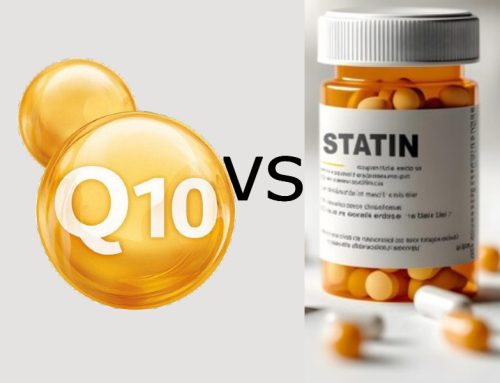
Dr. Svend Aage Mortensen (right), pictured here with Dr. Karl Folkers. Dr. Folkers determined the chemical structure of the Coenzyme Q10 molecule. He and Dr. Mortensen did the research establishing the link between low blood and biopsy tissue CoQ10 concentrations and the severity of heart disease.
Dr. Svend Aage Mortensen (1942 – 2015), M.D., DMSc. was associate professor and chief physician (cardiology) at The Heart Centre, Rigshospitalet, Copenhagen, Denmark. He was the lead researcher on the Q-Symbio study of the beneficial effects of Coenzyme Q10 on morbidity and mortality in chronic heart failure.
Multiple treatment options with Coenzyme Q10
Dr. Mortensen saw six possible treatment options with Coenzyme Q10 in the prevention and treatment of cardiovascular disease.
- Preventative treatment in statin therapy
- Adjunctive treatment of ischemic heart disease and angina pectoris
- Pretreatment for coronary artery bypass surgery or valve surgery
- Adjunctive treatment in arterial hypertension
- Preventative treatment in anthracycline therapy
- Adjunctive treatment in chronic heart failure
What did Dr. Mortensen know about Coenzyme Q10?
In developing a biochemical rationale for the above uses of Coenzyme Q10 in cardiovascular disease, Dr. Mortensen built on documented facts. He knew that Coenzyme Q10 plays an important role in the following biological actions:
- Producing of ATP in the cells
- Quenching of harmful free radicals
- Promoting cell membrane stability
- Regulating genes
Link between low heart tissue CoQ10 levels and heart disease
Moreover, Dr. Mortensen knew that abnormally low levels of Coenzyme Q10 in blood and in heart muscle tissue biopsies is directly associated with the severity of heart disease.
Decreasing biosynthesis of Coenzyme Q10 beyond the age of 21
Dr. Mortensen knew that the body’s own production of Coenzyme Q10 peaks in a person’s early 20s and then decreases with increasing age [2].
Inhibition of cholesterol production and inhibition of Coenzyme Q10 production
Dr. Mortensen knew that the statin medications that inhibit the body’s production of cholesterol also inhibit the body’s production of Coenzyme Q10.
Coenzyme Q10 and selenium reduce mortality in elderly people
Dr. Mortensen knew that supplementation of elderly people with Coenzyme Q10 and selenium significantly reduces cardiovascular mortality, significantly reduces the need for hospitalization, and significantly promotes better cardiac function.
Treatment option 1: Coenzyme Q10 in statin therapy
The same mevalonate biological pathway that produces cholesterol in the body also produces Coenzyme Q10. HMG-CoA reductase enzymes control the rate of production in the mevalonate pathway. The statin medications, which inhibit the action of the HMG-CoA reductase enzymes, significantly reduce the body’s production of Coenzyme Q10.
For Dr. Mortensen, it was very important that any patient taking a statin medication should also be taking a Coenzyme Q10 supplement, both because of the role that Coenzyme Q10 plays in cellular bioenergetics and because of the antioxidant role that Coenzyme Q10 plays in the body’s immune defense. Moreover, he knew that there is reason to think that Coenzyme Q10 supplementation of patients on statin medications can lessen the extent of statin-caused muscle pain and weakness.
Treatment option 2: Coenzyme Q10 in ischemic heart disease and angina pectoris
In the literature review to the KiSel-10 study, Professor Urban Alehagen laid out the evidence that dietary supplementation with Coenzyme Q10 has been shown to improve the heart muscle function and quality of life in patients with ischemic heart disease [1]. He speculated that the protective effects of Coenzyme Q10 can be explained by antioxidant effect of the continuous reduction of ubiquinone.
With respect to the effect of Coenzyme Q10 on angina pectoris, Mortensen based his thinking on five double-blind, placebo-controlled studies.
Treatment option 3: Pretreatment for coronary artery bypass surgery or valve surgery
Dr. Mortensen summarized the results of eight controlled studies with Coenzyme Q10, four involving coronary artery bypass surgery, two involving coronary artery bypass surgery or valve surgery, and one involving peripheral vascular surgery. In particular, he pointed to research on the protective effects of Coenzyme Q10 in cardiac surgery done by Dr. Franklin L. Rosenfeldt and his colleagues. The Rosenfeldt research was reported in the Journal of Thoracic and Cardiovascular Surgery in 2005.
Treatment option 4: Adjunctive treatment in arterial hypertension
In 2007, in the Journal of Human Hypertension, Dr. Rosenfeldt and his colleagues published a meta-analysis of clinical trials of Coenzyme Q10 in the treatment of hypertension. The researchers reviewed 12 clinical trials enrolling 362 patients. The Coenzyme Q10 treatment significantly lowered blood pressure. The placebo treatment was not associated with any change in blood pressure. The researchers concluded that Coenzyme Q10 can lower the systolic blood pressure of hypertensive patients by up to 17 mm Hg and can lower the diastolic blood pressure of hypertensive patients by up to 10 mm Hg without adverse side effects.
Dr. Mortensen concluded that Coenzyme Q10 supplementation should be used as a first-line therapy in borderline/mild hypertensives and as an adjuvant therapy for hypertensives on conventional high blood pressure medications.
Treatment option 5: Preventative treatment in anthracycline therapy
Several preclinical and clinical studies demonstrate that the cardiotoxicity caused by the administration of anthracycline medications used in cancer chemotherapy can be ameliorated by concomitant administration of Coenzyme Q10. The Coenzyme Q10 prevents damage to the mitochondria resulting from the oxidative stress caused by the anthracycline medications. Some research studies have shown that the dosage of the anthracycline medication can be increased with simultaneous Coenzyme Q10 supplementation.
Treatment option 6: Adjunctive treatment in chronic heart failure
The conventional treatment of heart failure involves many phases:
- Diet restriction: low salt, low saturated fat, low trans-fatty acids, high fiber
- Weight reduction: as necessary and as possible
- Physical activity: to the extent possible
- Smoking and alcohol consumption: quit if possible
- Medications, as prescribed, to ease the load on the heart:
- Angiotensin Converting Enzyme (ACE) Inhibitors to lower blood pressure
- Aldosterone antagonists to help the body remove excess fluid
- Beta blockers to slow down the heart rate and to lower the blood
- Digoxin to help the heart pump more blood with each contraction
- Diuretics to reduce fluid buildup in the lungs and swelling in the feet
Coenzyme Q10 as adjuvant treatment for heart failure
To the conventional therapy, Dr. Mortensen added Coenzyme Q0 adjuvant therapy [5].
Molyneux (2008) established that low blood Coenzyme Q10 concentrations are an independent predictor of chronic heart failure [3].
Of 13 double-blind studies of Coenzyme Q10 adjuvant therapy in chronic heart failure, enrolling 988 patients, 10 studies showed improvement in several clinical parameters such as New York Heart Association (NYHA) classification, exercise capacity, and quality of life after supplementation with Coenzyme Q10.
In 4 meta-analyses of randomized controlled studies of Coenzyme Q10 supplementation of heart failure patients, the results showed a mostly positive effect on left ventricular ejection fraction, sometimes with and sometimes without improvement of the patients’ NYHA functional class.
The evidence of the Q-Symbio study
After 106 weeks of treatment with 100 mg of Coenzyme Q10 three times a day, the patients in the active treatment group of the Q-Symbio study reaped several significant benefits from the supplementation as compared with the patients in the placebo group [4]. The following outcomes in the Q-Symbio study were statistically significant:
- Reduction in the number of Major Adverse Cardiovascular Events
- Reduction in the number of cardiovascular deaths
- Reduction in the all-cause mortality among the heart failure patients
- Fewer admissions to hospital
Where do we stand on Coenzyme Q10 and heart failure?
Altogether, 21 placebo-controlled studies of Q10 adjuvant treatment of heart failure patients have been carried out, and, in 18 of these trials, the results have shown positive effects. In the other three trials, the researchers hypothesized that the results may have been skewed by a lack of patient compliance or by flaws in the research design.
Coenzyme Q10 supplements are safe, affordable, and shown to have positive effects on heart health.
Read our key article on CoQ10 as adjuvant therapy for heart failure
Sources:
- Alehagen, U., Johansson, P., Björnstedt, M., Rosén, A., & Dahlström, U. (2013). Cardiovascular mortality and N-terminal-proBNP reduced after combined selenium and coenzyme Q10 supplementation: a 5-year prospective randomized double-blind placebo-controlled trial among elderly Swedish citizens. International Journal of Cardiology, 167(5), 1860-1866.
- Kalen A, Appelkvist EL, Dallner G. Age-related changes in the lipid compositions of rat and human tissues. Lipids. 1989;24(7):579–584.
- Molyneux, S. L., Florkowski, C. M., George, P. M., Pilbrow, A. P., Frampton, C. M., Lever, M., & Richards, A. M. (2008). Coenzyme Q10: an independent predictor of mortality in chronic heart failure. Journal Of The American College Of Cardiology, 52(18), 1435-1441.
- Mortensen, S. A., Rosenfeldt, F., Kumar, A., Dolliner, P., Filipiak, K. J., Pella, D., & … Littarru, G. P. (2014). The effect of coenzyme Q10 on morbidity and mortality in chronic heart failure: results from Q-SYMBIO: a randomized double-blind trial. JACC. Heart Failure, 2(6), 641-649.
- Mortensen, S. A. (2015). Coenzyme Q10: Will This Natural Substance Become a Guideline-Directed Adjunctive Therapy in Heart Failure? JACC. Heart Failure, 3(3), 270-271. doi:10.1016/j.jchf.2014.12.006
- Rosenfeldt, F. L., Haas, S. J., Krum, H., Hadj, A., Ng, K., Leong, J., & Watts, G. F. (2007). Coenzyme Q10 in the treatment of hypertension: a meta-analysis of the clinical trials. Journal Of Human Hypertension, 21(4), 297-306.
- Rosenfeldt, F., Marasco, S., Lyon, W., Wowk, M., Sheeran, F., Bailey, M., & … Pepe, S. (2005). Coenzyme Q10 therapy before cardiac surgery improves mitochondrial function and in vitro contractility of myocardial tissue. The Journal Of Thoracic And Cardiovascular Surgery, 129(1), 25-32.








Leave A Comment